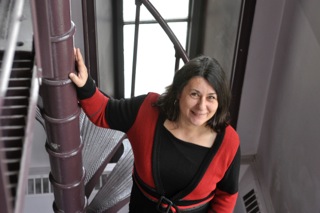A couple: a man, a woman.
Age: Elderly. Both have white hair.
Clothing: Him – we can see a white collar under his jacket.
Her – dark slacks and blazer. Glasses. Comfortable, brown walking shoes. A purse on her lap.
Place: The couple is seated on a bench beside the trunk of a tree, surrounded by a well-groomed lawn. We can see a building in the background.
Occupation: Both are retired. He has an officer’s pension from the military. Triple her modest pension. He is tall and upright. She is small and stocky with a gentle air about her. He has no one else but her. She has a son who comes to see her once a week, who brings both her and her companion canned goods. The son takes care of their bills, invites them to lunch, dinner. He picks them up in his car, drops them off again. She talks to him daily on the phone. She also has a daughter who has lived in Canada for more than forty years, who has only returned home twice, and it’s thanks to her companion’s cellphone that she can call her daughter at all and remind her of birthdays and anniversaries, including the date that she left the country, and always with the same, reproachful tone of voice.
They have an orderly way of life, the old woman and her companion, who came along filling the void after the death of the father of her two children. Having become accustomed to living as a couple, she was almost 70 when she found this man while searching through singles ads for seniors. Their life together is regimented, like in the military. Always waking up at the same time, she makes him his coffee and serves it to him in the living room.
This living room is also where she has displayed her goblens, embroidered wall hangings. She has given some of them to her children, and she used to fill custom orders. It took so long to make them. And when her eyes grew tired and could no longer follow the stitches, she made placemats and large embroidered tablecloths for tourists. Another woman used to sell them for her, because she wasn’t going to set up her wares in the market on her own! She was only doing this to supplement her income, to keep herself occupied, that’s all.
She doesn’t embroider anymore. Instead she does crossword puzzles and watches television in the evenings. Her companion goes out at a night for a drink. He doesn’t wander too far, though; he stays in the neighbourhood. And when he is out longer than an hour, she goes out to look for him.
One time when they were together on the tramway, he suddenly got off, leaving her alone for the rest of the ride. The police returned with her companion in the middle of the night, half-naked, without identity papers and no ability to recall that he had been victim of an attack by hooligans, a gang of youth. She made him promise that he would never go out on his own anymore. That he would call her. To come home just like a child comes home to his mother. She is now his caregiver, his bodyguard. She saw the signs, but she never mentioned them. The same signs of an illness that had stolen her own mother from her, for whom she had also been a caregiver, and spoonfed as she did for her own children when they were infants, when her mother no longer recognized her. She was familiar with this traitor who, little by little, was taking her man away: Alzheimer’s.
Sitting there on the bench, with his head hunched over, her companion looks down at his hands.
She’s drinking from the bottle.
Now let’s talk about this bottle on which we can see the famous logo, recognizable the world over. Let’s talk about the mythic drink in the bottle that was once banned here, on communist soil.
The Bulgarian people were once offered imitations of this drink, called Cola. It was the same colour, but it never served to placate the aura of desire that possessing and drinking the real thing could incite – to drink America, with all its wealth: unobtainable, distant, a dream.
Back then, getting your hands on a few bottles of Coca-Cola and being able to afford having them at your table was considered a sign of wealth, luxury, and prestige. People envied you. Coca-Cola and imported jeans – two symbols of a capitalistic world people wanted so desperately.
And now Bulgarians can buy these two products at the supermarket. But the aura of desire around such goods lives on.
The thirst for America has not yet been quenched. America has simply become…accessible.
The dream within reach of the mouth, and the grasp of the hand.
Born in Sofia, Bulgaria, Sonia Anguelova has lived and studied in Havana, Gapesie, Quebec City and, since 2000, Montreal. She has written numerous works for theatre, radio, in literary journals, as well as two poetry collections, a book of short stories (Eux autres) and a novel (Sans retour). A chapter in the French language textbook, Voix croisées (Chenelière Éducation) was recently dedicated to her writing. This year a collection of her poetry in French and Spanish will appear with the Cuban publisher Vigia.


 Deborah Ostrovsky edits and writes in Rosemont-La Petite-Patrie. Her work appears in McSweeney's Internet Tendency, Maisonneuve, Geist, Tablet, Herizons and carte blanche. Her essay about language learning, "Finding East" has been published in the anthology Cabin Fever: The Best New Canadian Non-Fiction. In 2017 she received the Marian Hebb Research Grant from the Access Copyright Foundation to pursue writing about the Magdalen Islands.
Deborah Ostrovsky edits and writes in Rosemont-La Petite-Patrie. Her work appears in McSweeney's Internet Tendency, Maisonneuve, Geist, Tablet, Herizons and carte blanche. Her essay about language learning, "Finding East" has been published in the anthology Cabin Fever: The Best New Canadian Non-Fiction. In 2017 she received the Marian Hebb Research Grant from the Access Copyright Foundation to pursue writing about the Magdalen Islands.